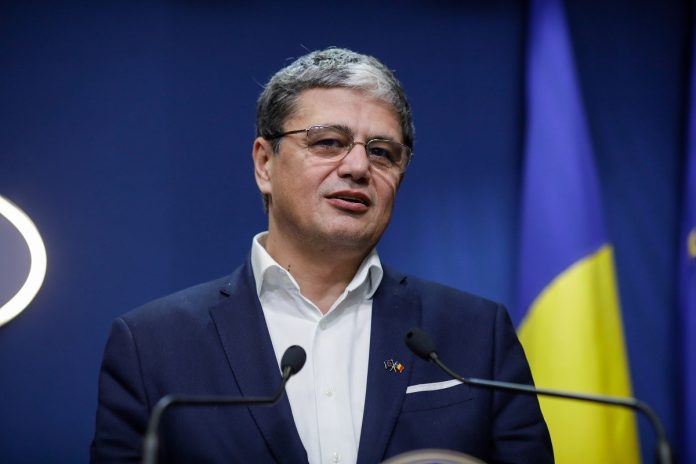The main conclusion that emerged from the trip to Washington of a delegation of the Ministry of Finance (MF), led by minister of Finance Marcel Bolos is that Romania will benefit from support for fiscal consolidation and increased investment in infrastructure.
The head of the Ministry of Finance led the institution’s delegation to the spring meetings of the World Bank Group and the International Monetary Fund, April 16 to 21, 2024. On the sidelines of the meetings, the MF delegation met with senior representatives of the World Bank (WB), the International Monetary Fund (IMF), the International Finance Corporation (IFC), as well as the rating agencies S&P and Moody’s.
According to a press release from the institution, the MF delegation met with Eugene Rhuggenaath, World Bank Group Executive Director representing the Constituency of Armenia, Bosnia and Herzegovina, Bulgaria, Croatia, Cyprus, Georgia, Israel, Moldova, Montenegro, The Netherlands, North Macedonia, Romania, and Ukraine, and Antonella Bassani, Vice President of the Europe and Central Asia Region at the World Bank. Discussions focused on World Bank investments in key areas such as education, health, development policies aimed at green and inclusive growth and disaster risk management.
„The Finance minister stated that Romania needs the support of international partners so that all the opportunities we have through the PNRR [the National Recovery and Resilience Plan] (29 billion euros) and the Cohesion Policy (46 billion euros) can be exploited. The loans contracted by Romania from the World Bank, currently under implementation, as well as the portfolio of loans in preparation were also reviewed. In this regard, World Bank representatives assured that they will accelerate the contracting process for loans of approximately one billion euros for: development policies aimed at green and inclusive growth (Development Policy Financing/Loan – DPF/DPL); disaster risk management (Catastrophic Deferred Drawdown Option – CAT-DDO),” reads the press release.
Marcel Bolos told World Bank officials that he continues to rely on IFC support for private investment in Romania, by identifying new financing opportunities to help reduce infrastructure gaps in transport, renewable energy, waste and water treatment. To this end, he invited the World Bank’s technical teams in Romania to collaborate with the MF team.
According to the Ministry of Finance, Romania is the first country in terms of IFC portfolio, with 2.1 billion dollars, having the tenth largest exposure globally, with over 7 billion dollars invested in various sectors since 1991.
During the discussions, the IFC representatives gave assurances that they will continue to support private investment in Romania by identifying new financing opportunities and responding to new needs to mobilize private investment to help bridge the infrastructure, renewable energy, waste and water treatment gaps in Romania. The IFC also wants to be actively involved in supporting the implementation of priority public-private partnership (PPP) projects in the fields of health, transport or waste management.
Strengthening the financial sustainability of the banking sector and providing lines of finance to financial institutions in Romania for measures to reduce the impact of climate change will remain a priority. At the same time, IFC will remain active in the area of technical assistance (e.g. Green Banking Academy) offered to the financial sector to support the transition to the green economy and the reduction of climate change risks for these institutions.
Discussions with the IMF’s Fiscal Affairs Department (FAD) team focused on measures to modernise the National Agency for Fiscal Administration, which should lead to an improvement in tax revenue collection by 2.5 percent of GDP, as well as measures to combat tax evasion.
The last day of the program in Washington included discussions with senior representatives of the IMF management, Paul Hilbers, Executive Director at the IMF Constituency to which Romania belongs, Kenji Okamura, IMF Deputy Managing Director, and Alfred Kammer, Director of the European Department of the IMF.
„Together with the Deputy Governor of the National Bank of Romania, Leonardo Badea, the Minister of Finance presented Romania’s efforts to maintain macroeconomic stability in Romania, welcomed by the IMF team. Seen from overseas, despite the risks that persist at the NATO gates, Romania continues to represent a regional factor of balance, under the conditions of existing geopolitical tensions and economic disruptions,” the MF press release added.
During the discussions, the action plan for increasing the degree of revenue collection to the general consolidated state budget for 2024, a package that includes digitalization measures to increase collection and combat tax evasion was also presented to the IMF team.
The Romanian side presented to the rating agencies Romania’s economic particularities, as well as the strategies, structural reforms and responsible fiscal policies envisaged to ensure long-term macroeconomic stability.
The Finance minister specified Romania’s commitment to a process of modernization of Romania through European funds, national funds and reforms contained in the National Recovery and Resilience Plan, also mentioning the expectations that these reforms will generate the modernisation of the Romanian state and public administration and the sustainability of certain categories of public expenditure.
„We are counting on this economic growth as one of our basic pillars for sustainable development. We also envisage fiscal consolidation leading to the modernisation of our tax system, through measures to combat tax evasion or the implementation of digitalisation projects. Romania is committed to this irreversible path of modernisation and implementation of investment projects and is also committed to reforms that will lead to the sustainability of the public expenditure that Romania has,” concluded Minister Marcel Bolos.
AGERPRES




